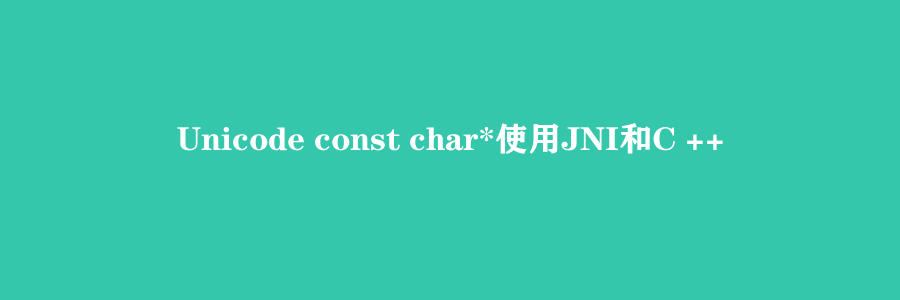2023-01-20 294
简单的问题.如何使用JNI和C ++?
这是我的问题,也是我已经尝试的内容:

const char* value = (some value from server);
(*env)->NewStringUTF(value);这里的问题是NewsTringUtf返回UTF字符串,它不喜欢某些非UTF8字符(有点明显,但值得一试).
尝试2,使用新闻流:
const char* value = (some value from server);
(*env)->NewString(value, strlen(value));当新闻弦接受并返回Unicode字符串时,strlen(value)方法不起作用,因为它需要一个jsize param,而不仅仅是一个良好的ol’size_t或长度.
我们如何获得JSize?根据(非常少量的)文档和在线示例,您可以从Jintarray中获得JSize.
我找不到有关如何将const char*转换为某种jarray的信息,无论如何这可能是一个坏主意.
另一个选项是将jsize从size_t中的int中取出,我也没有成功.
有人遇到这个问题,还是对如何解决问题有建议?
似乎JSize是我缺少Unicode转换的关键.
另外,我正在使用JNI和Android NDK,以防万一它可以帮助任何人.
谢谢.
编辑
我刚刚意识到新闻结构也期待着JCHAR*,因此其签名为(JCHAR*,JSize).这意味着即使使用jsize const char*也不会编译.
编辑2
使用NewsTringUtf方法时,这是在运行时抛出的例外.这与@Fadden在谈论的内容有关:
JNI WARNING: NewStringUTF input is not valid Modified UTF-8: illegal start byte 0xb7 03string: ' : Method(d6, us-dev1-api, 0), , 訩�x�m�P)正如错误消息显示的那样,您的字符*不是有效的修改-UTF8,因此JVM中止了.
您有两种避免它们的方法.
Android Art Check_jni.cc中的检查逻辑如下
art/+/35e827a/runtime/check_jni.cc#1273
jstring toJString(JNIEnv* env, const char* bytes) {
const char* error = nullptr;
auto utf8 = CheckUtfBytes(bytes, &error);
if (error) {
std::ostringstream msg;
msg << error << " 0x" << std::hex << static_cast<int>(utf8);
throw std::system_error(-1, std::generic_category(), msg.str());
} else {
return env->NewStringUTF(bytes);
}这样,您始终得到有效的jstring.
jstring toJString(JNIEnv *env, const char *pat) {
int len = strlen(pat);
jbyteArray bytes = env->NewByteArray(len);
env->SetByteArrayRegion(bytes, 0, len, (jbyte *) pat);
jstring encoding = env->NewStringUTF("utf-8");
jstring jstr = (jstring) env->NewObject(java_lang_String_class,
java_lang_String_init, bytes, encoding);
env->DeleteLocalRef(encoding);
env->DeleteLocalRef(bytes);
return jstr;
}以这种方式,您只避免崩溃,但是字符串可能仍然没有有效,并且您将记忆复制两次,表现不佳.
加上代码:
inline bool checkUtfBytes(const char* bytes) {
while (*bytes != '\0') {
const uint8_t* utf8 = reinterpret_cast<const uint8_t*>(bytes++);
// Switch on the high four bits.
switch (*utf8 >> 4) {
case 0x00:
case 0x01:
case 0x02:
case 0x03:
case 0x04:
case 0x05:
case 0x06:
case 0x07:
// Bit pattern 0xxx. No need for any extra bytes.
break;
case 0x08:
case 0x09:
case 0x0a:
case 0x0b:
// Bit patterns 10xx, which are illegal start bytes.
return false;
case 0x0f:
// Bit pattern 1111, which might be the start of a 4 byte sequence.
if ((*utf8 & 0x08) == 0) {
// Bit pattern 1111 0xxx, which is the start of a 4 byte sequence.
// We consume one continuation byte here, and fall through to consume two more.
utf8 = reinterpret_cast<const uint8_t*>(bytes++);
if ((*utf8 & 0xc0) != 0x80) {
return false;
}
} else {
return false;
}
// Fall through to the cases below to consume two more continuation bytes.
case 0x0e:
// Bit pattern 1110, so there are two additional bytes.
utf8 = reinterpret_cast<const uint8_t*>(bytes++);
if ((*utf8 & 0xc0) != 0x80) {
return false;
}
// Fall through to consume one more continuation byte.
case 0x0c:
case 0x0d:
// Bit pattern 110x, so there is one additional byte.
utf8 = reinterpret_cast<const uint8_t*>(bytes++);
if ((*utf8 & 0xc0) != 0x80) {
return false;
}
break;
}
}
return true;
}以上所述是小编给大家介绍的Unicode const char*使用JNI和C ++,希望对大家有所帮助,如果大家有任何疑问请给我留言,小编会及时回复大家的。在此也非常感谢大家对77isp云服务器技术网的支持!
原文链接:https://77isp.com/post/26044.html
=========================================
https://77isp.com/ 为 “云服务器技术网” 唯一官方服务平台,请勿相信其他任何渠道。
数据库技术 2022-03-28
网站技术 2022-11-26
网站技术 2023-01-07
网站技术 2022-11-17
Windows相关 2022-02-23
网站技术 2023-01-14
Windows相关 2022-02-16
Windows相关 2022-02-16
Linux相关 2022-02-27
数据库技术 2022-02-20
抠敌 2023年10月23日
嚼餐 2023年10月23日
男忌 2023年10月22日
瓮仆 2023年10月22日
簿偌 2023年10月22日
扫码二维码
获取最新动态
